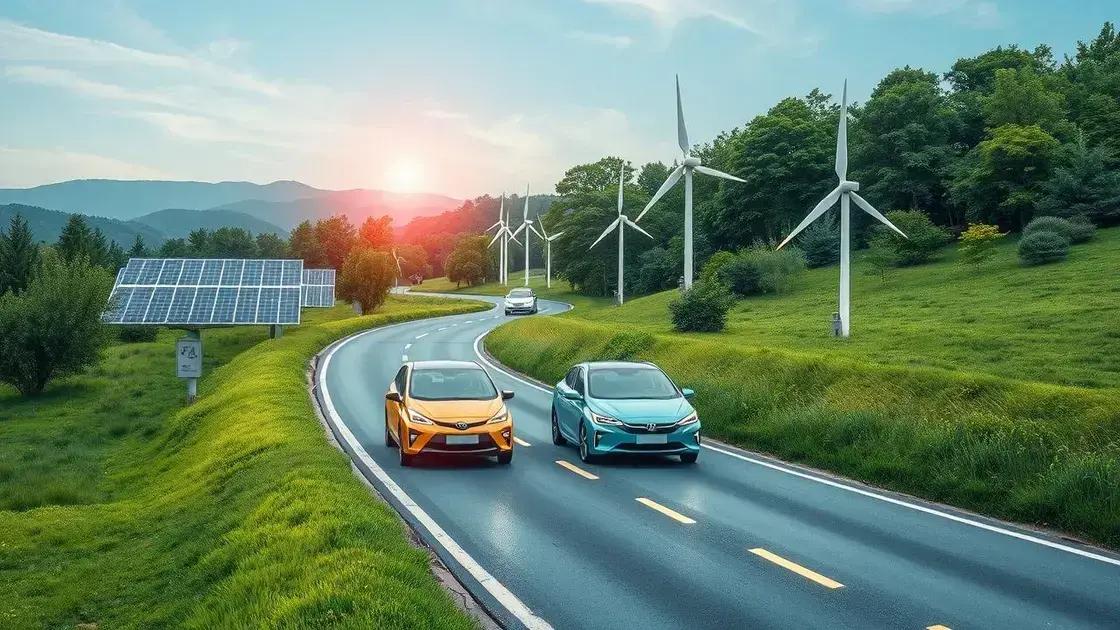Insights on electric vehicle news and trends

The future of electric mobility involves advancements in battery technology, increased charging infrastructure, and the integration of autonomous vehicles, which collectively enhance convenience, sustainability, and efficiency in transportation.
Insights on electric vehicle news provide a glance into the rapidly evolving world of electric vehicles. Have you ever wondered what new advancements are shaping the future of transportation? In this article, we delve into key developments and how they affect our daily lives.
Latest electric vehicle models and features
The latest electric vehicle models are not just about sustainability; they feature cutting-edge technology and impressive performance. Car manufacturers are racing to innovate, creating vehicles that appeal to drivers looking for efficiency and style.
You’ll find that many of the recent models come equipped with advanced safety systems and smart technology. These features are designed to enhance the driving experience while ensuring a safe journey.
Top EV Models of the Year
Some of the standout electric vehicles this year include:
- The Tesla Model S offers a blend of luxury and performance, with a rapid acceleration and long range.
- The Ford Mustang Mach-E combines the iconic Mustang spirit with zero-emissions technology, appealing to a younger demographic.
- The Volkswagen ID.4 is praised for its spacious interior and user-friendly features, making it family-friendly.
- The Hyundai Ioniq 5 stands out for its unique design and fast charging capability, appealing to tech-savvy drivers.
These models showcase a variety of options, ensuring there’s something for everyone. Also, manufacturers are focusing on the use of more sustainable materials in the production of these vehicles. This shift aims to reduce the overall environmental impact.
Moreover, many electric vehicles now offer features like over-the-air updates, which allow car owners to receive the latest software improvements without visiting a dealership. This is a game changer in maintaining vehicle efficiency and performance.
Innovative Features
The features in today’s EVs are also advancing rapidly. From high-performance battery packs to regenerative braking systems, these innovations enhance efficiency and make driving more enjoyable.
Some of the most notable features include:
- Autonomous driving technology that allows for increased safety and convenience.
- Real-time battery monitoring that helps drivers optimize their charging habits.
- Smartphone integration that enables seamless connectivity with navigation and entertainment apps.
- Advanced climate control systems that enhance comfort without draining battery life.
The rapid evolution of electric vehicle technology is fascinating. It not only makes driving more enjoyable but also addresses the important issue of climate change. As electric vehicle technology advances, we can expect the distance between electric and traditional cars to continue to narrow.
Impact of EV technology on the environment

The impact of EV technology on the environment is a key topic in today’s discussions about sustainability. By replacing traditional vehicles, electric cars are playing a significant role in reducing greenhouse gas emissions.
Electric vehicles (EVs) produce no tailpipe emissions, which means they do not release harmful pollutants directly into the air. This shift helps improve air quality, especially in urban areas where smog and pollution can be a serious issue. Moreover, the reduction of fossil fuel consumption is crucial in the fight against climate change.
Benefits of Electric Vehicles
There are several environmental benefits associated with electric vehicles:
- Lower emissions: EVs contribute to lower carbon emissions, which helps tackle global warming.
- Reduced noise pollution: Electric cars operate more quietly than gasoline vehicles, creating a more peaceful neighborhood atmosphere.
- Energy efficiency: Electric motors are generally more efficient than internal combustion engines, meaning less energy is wasted.
- Renewable energy integration: EVs can be powered by renewable energy sources, further minimizing their environmental footprint.
The transition to electric vehicles also encourages the development of clean energy sources. As more people adopt EV technology, there is an increasing demand for renewable energy. This shift can lead to greater investment in solar, wind, and other sustainable energy projects, promoting a greener energy grid.
However, it’s important to look at the entire lifecycle of electric vehicles. While they are cleaner during operation, the production of lithium-ion batteries can have environmental impacts. Mining for lithium, cobalt, and nickel can lead to habitat destruction and pollution. Efforts are being made to improve battery recycling processes and develop more sustainable battery technologies to mitigate these issues.
The Future of EVs and Sustainability
As technology advances, we can expect even greater improvements in the environmental impact of electric vehicles. Innovations in battery technology, such as solid-state batteries, promise increased performance with less harmful environmental impact.
Furthermore, as charging infrastructure expands and renewable energy sources become more prevalent, the overall environmental benefits of EVs will continue to grow. The future of transportation is leaning heavily toward electric vehicles, and their positive effects on our environment are becoming increasingly evident.
Electric vehicle charging infrastructure developments
The electric vehicle charging infrastructure is essential for the widespread adoption of EVs. As more people choose electric cars, the need for accessible and efficient charging stations grows. This development helps reduce anxiety about running out of battery on the road.
In recent years, several advancements in charging infrastructure have emerged, making it easier for EV owners to charge their vehicles. Charging stations are being installed in various locations, including shopping centers, public parking lots, and along highways. This expansion ensures that drivers can find a charging point when they need it.
Types of Charging Stations
There are several types of charging stations available for electric vehicles:
- Level 1 Chargers: These use a standard 120-volt outlet and are typically available at home. They are slow but convenient for overnight charging.
- Level 2 Chargers: These are usually found in public locations and provide faster charging at 240 volts, reducing charging time significantly.
- DC Fast Chargers: Ideal for urban areas and along highways, these can quickly charge an EV in about 30 minutes, making them suitable for long trips.
- Wireless Charging: An emerging technology, it allows EVs to charge without being plugged in, offering convenience and ease of use.
As technology improves, charging times are expected to decrease even further. This will make owning an electric vehicle as easy as driving a gasoline-powered car.
Governments and private companies are also investing in the expansion of charging networks. Initiatives to build more charging stations are being launched globally, particularly in urban areas. This push is crucial to support the increasing number of EVs on the roads.
Future Trends in Charging Infrastructure
Looking ahead, we can expect innovative solutions to emerge. Fast-charging stations with enhanced capabilities will likely become more commonplace. Additionally, charging stations integrated with renewable energy sources, such as solar and wind power, will promote sustainability.
Moreover, smart charging technology is rapidly developing. This allows EV owners to plan charging times based on grid demand and electricity prices, making it more economical. The integration of smart grids** with charging stations will create a more efficient energy ecosystem.
As the infrastructure continues to grow and improve, the transition to electric vehicles will become smoother. The combination of convenience, speed, and reliability in charging will increase consumer confidence in choosing electric cars over traditional vehicles.
Future trends in electric mobility

The future trends in electric mobility are shaping the way we think about transportation. As technology advances, we can expect significant changes in how electric vehicles (EVs) are integrated into our daily lives.
One of the primary trends is the increase in battery technology efficiency. Manufacturers are investing in research to create batteries that charge faster and have longer lifespans. This will make electric vehicles more convenient for everyday users, allowing for longer trips without frequent charging stops.
Integration of Autonomous Driving
Another exciting trend is the growth of autonomous driving technology. Many companies are working on self-driving electric vehicles, which could revolutionize how we travel. These vehicles promise to improve safety and reduce traffic congestion by optimizing driving patterns.
Moreover, as autonomous vehicles become more widespread, we can expect to see changes in infrastructure as well. Smart city designs will incorporate vehicle-to-infrastructure communication, where cars will interact with traffic signals and road conditions, enhancing overall traffic management.
Charging Innovations
Charging technology is also evolving. Fast charging stations are being developed with even higher capacities, minimizing charging times significantly. Wireless charging is another fascinating innovation that allows EVs to charge without physical connections, increasing convenience for drivers.
Many businesses are also looking into energy management systems to maximize efficiency. These systems can determine the optimal time to charge based on grid demand and electricity prices. This capability will not only save money but also help in managing energy resources better.
Additionally, there is a growing focus on using renewable energy sources to power charging stations. Integrating solar panels into charging infrastructure is becoming more common, ensuring that electric vehicles run on green energy.
Shared Electric Mobility
Shared mobility services are also on the rise. Electric bike and scooter-sharing programs are becoming popular in urban areas, offering an eco-friendly option for short-distance commuting. These options reduce the number of cars on the road, helping to decrease traffic and pollution.
As cities strive to provide better public transportation options, electric buses and shuttles are increasingly being adopted. This not only supports sustainable urban development but also promotes the shift towards electrified public transport systems.
In conclusion, the future of electric mobility looks promising. With continuous advancements in technology and increasing support for sustainable practices, electric vehicles will likely become the primary mode of transportation in the coming decades.
FAQ – Frequently Asked Questions about Electric Mobility
What are the main benefits of electric vehicles?
Electric vehicles reduce greenhouse gas emissions, improve air quality, and offer lower operational costs compared to gasoline vehicles.
How does charging infrastructure affect electric vehicle adoption?
The availability of charging stations makes EVs more convenient to use, alleviating range anxiety for potential buyers.
What advancements are being made in battery technology?
New battery technologies aim for faster charging, longer life, and increased sustainability, making electric vehicles more appealing.
How are autonomous vehicles related to electric mobility?
Many autonomous vehicle prototypes are electric, combining the benefits of both technologies to enhance safety and efficiency on the roads.





